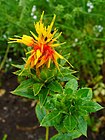Note: This is a project under development. The articles on this wiki are just being initiated and broadly incomplete. You can Help creating new pages.
Carthamus tinctorius - Kust
Carthamus tinctorius is an annual plant native to the Mediterranean countries and cultivated in Europe and the U.S.
Contents
[hide]- 1 Uses
- 2 Parts Used
- 3 Chemical Composition
- 4 Common names
- 5 Properties
- 6 Habit
- 7 Identification
- 8 List of Ayurvedic medicine in which the herb is used
- 9 Where to get the saplings
- 10 Mode of Propagation
- 11 How to plant/cultivate
- 12 Commonly seen growing in areas
- 13 Photo Gallery
- 14 References
- 15 External Links
Uses
Heart disease, Cholesterol, Tumours, Stomatitis, Fever, Eruptive skin complaints, Inflammation, Wound, Rheumatism
Parts Used
Chemical Composition
The major constituent is the chalcone C-glucoside carthamin (up to 8.5%)[1]
Common names
| Language | Common name |
|---|---|
| Kannada | |
| Hindi | Kusum |
| Malayalam | |
| Tamil | Kusumba |
| Telugu | |
| Marathi | NA |
| Gujarathi | NA |
| Punjabi | NA |
| Kashmiri | NA |
| Sanskrit | |
| English | Safflower, Dyers' saffron |
Properties
Reference: Dravya - Substance, Rasa - Taste, Guna - Qualities, Veerya - Potency, Vipaka - Post-digesion effect, Karma - Pharmacological activity, Prabhava - Therepeutics.
Dravya
Rasa
Guna
Veerya
Vipaka
Karma
Prabhava
Habit
Identification
Leaf
| Kind | Shape | Feature |
|---|---|---|
| Simple | Ovate-lanceolate | Leaves armed with small, spiny teeth |
Flower
| Type | Size | Color and composition | Stamen | More information |
|---|---|---|---|---|
| Unisexual | 1 to 11/2 inches across | Orange-yellow | 5 | This thistle is valued for its orange-yellow flowers in summer and for the oil contained in its seeds |
Fruit
| Type | Size | Mass | Appearance | Seeds | More information |
|---|---|---|---|---|---|
| Simple | Clearly grooved lengthwise, Lowest hooked hairs aligned towards crown | Many | {{{6}}} |
Other features
List of Ayurvedic medicine in which the herb is used
Where to get the saplings
Mode of Propagation
How to plant/cultivate
Safflower probably grows best in the semi-arid subtropics, but cultivars have been developed that widen its range and it is now cultivated from the temperate zone to higher elevations in the tropics[3]
Commonly seen growing in areas
Photo Gallery
References
External Links
- Ayurvedic Herbs known to be helpful to treat Heart disease
- Ayurvedic Herbs known to be helpful to treat Cholesterol
- Ayurvedic Herbs known to be helpful to treat Tumours
- Ayurvedic Herbs known to be helpful to treat Stomatitis
- Ayurvedic Herbs known to be helpful to treat Fever
- Ayurvedic Herbs known to be helpful to treat Eruptive skin complaints
- Ayurvedic Herbs known to be helpful to treat Inflammation
- Ayurvedic Herbs known to be helpful to treat Wound
- Ayurvedic Herbs known to be helpful to treat Rheumatism
- Herbs with Seeds used in medicine
- Herbs with Leaves used in medicine
- Herbs with common name in Hindi
- Herbs with common name in Tamil
- Herbs with common name in English
- Habit - Herb
- Index of Plants which can be propagated by Seeds
- Herbs that are commonly seen in the region of Temperate area
- Herbs that are commonly seen in the region of Tropical area
- Herbs
- Ayurvedic herbs that don't have seed photos
- Asteraceae






